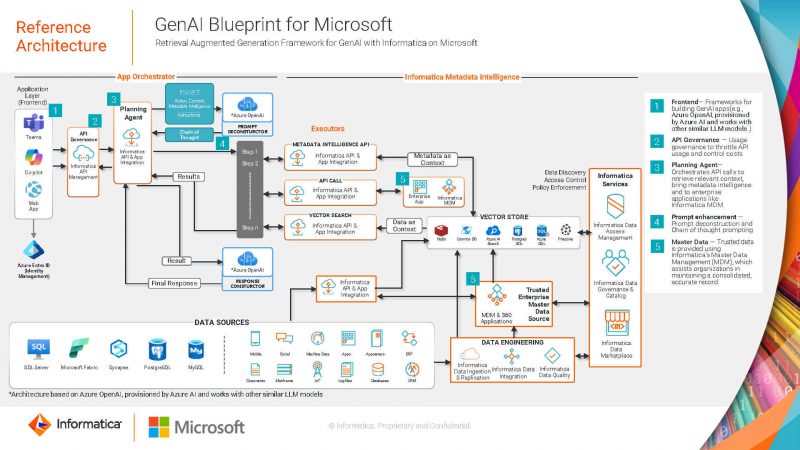 CLOUD
CLOUD
 CLOUD
CLOUD
 CLOUD
CLOUD
Informatica Inc. today announced three new capabilities for Microsoft Corp.’s Azure cloud aimed at smoothing the process of building, deploying and activating artificial intelligence and analytical applications using trusted data.
The Gen AI Blueprint for Azure OpenAI provides a set of reference architectures and templates based on Informatica’s Intelligent Data Management Cloud platform and Azure Open AI services. Informatica Blueprints (pictured below) are free strategic guides or frameworks aimed at helping organizations build and scale data management applications. They include best practices, architecture recommendations and deployment strategies tailored to various use cases, such as data integration, data governance, data quality, master data management and cloud data warehousing.
The new Microsoft-specific generative AI blueprint components, called “recipes,” simplify the creation of generative AI applications and Microsoft Copilot experiences. They detail how organizations can integrate Azure OpenAI, Azure AI Search and vector databases like Pinecone Systems Inc.’s vector database to speed AI projects while maintaining data integrity and governance. The blueprint provides contextualized prompts and responses based on standard business glossary terms, while embedded data quality controls optimize retrieval-automated generation dataset selection.

Informatica Chief Executive Amit Walia said governance is becoming an increasingly crucial priority as generative AI applications move into production.
“Typically, companies begin a pilot and they don’t have think about governance,” he said, “but the moment they come out of the pilot and want to take it to a next level the conversation very quickly becomes how do they govern it, who has access to the data. The more these experiments start giving them early results, governance is something they have to face.”
A second announcement, Open Table Iceberg Support for Azure Data Lake Storage Gen2, supports data migration and integration to ADLS Gen2 in Apache Iceberg format. That enables uses to take advantage of Iceberg’s high-performance and low cost in storing and accessing large-scale data sets for Microsoft Fabric and Power BI analytics workloads. Users can also select the most appropriate query engines for their use cases.
Enhanced SQL ELT for Microsoft Fabric supports no-code data pipeline definition and execution with in-database SQL-based processing. Informatica, which is a Microsoft design partner, said the service enables organizations to consolidate and transform data directly within Microsoft Fabric’s data warehouse using and cleanse it data for analytics.
ELT stands for “extract/load/transform,” a data integration process in which data is first extracted from various sources, loaded into a data lake or data warehouse, and then transformed within that target system into formats useful for analysis.
Informatica said SQL ELT allows customers to validate data and enhance analytics efficiently through within Microsoft Fabric, including data governance, processing quality checks and insights derived from Microsoft PowerBI.
Support our mission to keep content open and free by engaging with theCUBE community. Join theCUBE’s Alumni Trust Network, where technology leaders connect, share intelligence and create opportunities.
Founded by tech visionaries John Furrier and Dave Vellante, SiliconANGLE Media has built a dynamic ecosystem of industry-leading digital media brands that reach 15+ million elite tech professionals. Our new proprietary theCUBE AI Video Cloud is breaking ground in audience interaction, leveraging theCUBEai.com neural network to help technology companies make data-driven decisions and stay at the forefront of industry conversations.